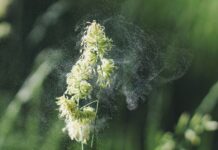As the festive period approaches, parents of two and three year-olds are being reminded to ensure their children are protected against flu.
Children aged two to ten years (age on 31st August 2018) are also eligible as the vaccine programme for children is again being extended this year. The vaccine for adults is a small injection, but for children it is a simple nasal spray. Children aged between two and three years can receive the nasal vaccine at their GP surgery while those in reception class and every primary school (years 1-6) can get it at school.
Young children are known to be very good at spreading germs and as families come together this festive season, it is recommended they have the vaccine to protect the whole family.
The flu vaccine is the single best way to protect against catching and spreading flu. The vaccine protects the child and also helps protect others too by reducing the spread of flu.
Influenza can affect people of all ages, and can be severe. Last winter in Wales, 17,000 children and adults were diagnosed with influenza, with 192 admitted to intensive care units.
For most healthy children, influenza can mean several miserable days at home in bed. However, parents should be aware that flu can sometimes result in serious complications, especially for very young children and those with long term health problems.
For two and three year old children the vaccine will be given at their local GP surgery. If you have not heard from your GP, please contact them as soon as possible to make an appointment.
Jenny Israel, Head of Children’s Public Health Nursing, Hywel Dda University Health Board explains why it’s so important that eligible children receive the flu nasal spray vaccine.
She said, “We are encouraging children in the eligible groups to be vaccinated to prevent the spread of flu in schools and the wider community. Flu symptoms include fever, chills, headaches and aching muscles. In young children gastrointestinal symptoms such as vomiting and diarrhoea can also occur, and can lead to some children needing admission to hospital, which can be a frightening experience for the child and the parents. For those most at risk – the very young, vulnerable adults, pregnant women and the elderly, flu can be very serious. It can lead to serious illnesses such as bronchitis, otitis media (particularly in children), pneumonia; and in some cases meningitis and encephalitis, and even death.”
Ros Jervis, Director of Public Health for Hywel Dda University Health Board, echoes what Jenny says: “The nasal spray vaccine provides very effective protection for children against influenza and it works best if given before flu starts to circulate.
“Influenza spreads very easily. Extending the programme to more children this year will help protect them from catching flu, and will also prevent them spreading it to others in the community who may be very vulnerable. I particularly call on the parents of 2-3 year old children to get their children vaccinated with the simple nasal spray this year as the statistics show as few as six 2-3 year old children vaccinated prevents one case of flu – this age group has the best opportunity over all others to help stop the spread of flu – they are our ultimate “superprotectors”.
While most NHS flu vaccines are given in GP surgeries, free vaccination is also available for some eligible adults in many community pharmacies across Wales. Carers, volunteers providing planned emergency first aid, Community First Responders and for the first time this year, people working in care homes that have regular client contact are also entitled to the vaccine. It’s also recommended that frontline health and social care workers have the free vaccine to protect themselves and those they care for. They can talk to their occupational health department or employer about where and when they can get their vaccine.
Immunity wanes over time and each year the flu viruses that circulate and cause health problems can change so vaccines are also changed to match them. Getting an annual flu vaccine is the best way to protect yourself and others from catching or spreading influenza.
For further information visit www.beatflu.org or follow Beat Flu on Facebook and Twitter.
Dylai rhieni sicrhau bod eu plant yn cael brechiad rhag y ffliw nawr! Peidiwch â gadael i ffliw ddifetha gwyliau Nadolig eich plant chi.
Wrth i dymor yr ŵyl nesáu, mae rhieni plant dwy a thair oed yn cael eu hatgoffa i warchod eu plant rhag y ffliw.
Mae plant rhwng dwy a deg oed (oed ar 31 Awst 2018) yn gymwys hefyd wrth i’r rhaglen frechu ar gyfer plant gael ei hymestyn eto eleni. Pigiad bach yw’r brechiad ar gyfer oedolion, ond i blant chwistrell trwyn syml yw’r brechiad. Gall plant rhwng dwy a thair oed dderbyn y brechiad drwy chwistrell trwyn yn eu meddygfa a bydd y rhai yn y dosbarth derbyn ac ym mlynyddoedd ysgol 1 i 6 yn gallu ei gael yn yr ysgol
Mae plant ifanc yn dda iawn am ledaenu germau ac wrth i deuluoedd ddod at ei gilydd dros y Nadolig, argymhellir eu bod yn cael y brechiad i warchod y teulu cyfan.
Brechiad y ffliw yw’r ffordd unigol orau o warchod rhag dal a lledaenu’r ffliw. Mae’r brechiad yn gwarchod y plentyn a hefyd yn helpu i warchod pobl eraill drwy leihau lledaeniad y ffliw.
Gall y ffliw effeithio ar bobl o bob oed a gall fod yn ddifrifol. Y gaeaf diwethaf yng Nghymru, cafodd 17,000 o blant ac oedolion ddiagnosis o’r ffliw, gyda 192 wedi’u hanfon i unedau gofal dwys.
I’r rhan fwyaf o blant iach, gall y ffliw olygu sawl diwrnod diflas gartref yn y gwely. Ond dylai rhieni ddeall bod y ffliw’n gallu arwain at gymhlethdodau difrifol weithiau, yn enwedig i blant ifanc iawn a’r rhai sydd â phroblemau iechyd tymor hir.
I blant dwy a thair oed bydd y brechiad yn cael ei roi yn y feddygfa. Os nad ydych chi wedi clywed gan eich meddyg teulu, cysylltwch â’r feddygfa cyn gynted â phosib i wneud apwyntiad.
Mae Jenny Israel, Pennaeth Nyrsio Iechyd Cyhoeddus– Plant, Bwrdd Iechyd Prifysgol Hywel Dda, yn egluro pam y mae mor bwysig i blant cymwys gael y brechlyn sydd ar ffurf chwistrell trwy’r trwyn.
Meddai, “Rydym yn annog plant mewn grwpiau cymwys i gael eu brechu er mwyn atal y ffliw rhag ymledu mewn ysgolion ac yn y gymuned ehangach. Mae symptomau’r ffliw yn cynnwys gwres, teimlo’n oer, cur pen a chyhyrau poenus. Gall plant ifanc hefyd ddioddef symptomau gastroberfeddol megis chwydu a dolur rhydd, a gall olygu bod angen i rai plant gael eu derbyn i’r ysbyty, sy’n gallu bod yn frawychus i’r plant a’r rhieni. Gall y ffliw fod yn ddifrifol iawn i’r sawl sy’n wynebu’r risg fwyaf, sef plant ifanc iawn, oedolion agored i niwed, menywod beichiog a phobl hŷn. Gall arwain at salwch difrifol megis broncitis, llid y glust ganol (yn enwedig ymhlith plant) a niwmonia, ac at lid yr ymennydd ac enseffalitis mewn rhai achosion, a gall ladd hyd yn oed.”
Meddai Ros Jervis, Cyfarwyddwr Iechyd Cyhoeddus Bwrdd Iechyd Prifysgol Hywel Dda, yn adleisio geiriau Jenny: “Mae’r brechiad drwy chwistrell trwyn yn rhoi gwarchodaeth effeithiol iawn i blant rhag y ffliw ac mae’n fwy effeithiol o’i roi cyn i’r ffliw ddechrau ymddangos.
“Mae ffliw yn lledaenu’n rhwydd iawn. Bydd ymestyn y rhaglen i gynnwys mwy o blant eleni’n helpu i’w gwarchod rhag dal y ffliw, a bydd hefyd efallai yn eu hatal rhag ei ledaenu i eraill yn y gymuned sy’n agored iawn i niwed. Yr wyf yn galw’n arbennig ar rieni plant 2-3 i frechu eu plant eleni gyda’r chwistrell trwynol syml, gan fod yr ystadegau’n dangos bod cyn lleied â chwech o blant 2-3 oed sydd wedi’u brechu yn atal un achos o ffliw – mae gan y grŵp oedran hwn y cyfle gorau o bawb i helpu i atal lledaeniad y ffliw – nhw yw ein harwyr amddiffynnol pennaf.”
Er bod y mwyafrif o frechlynnau ffliw y Gwasanaeth Iechyd Gwladol yn cael eu rhoi mewn meddygfeydd, mae brechlyn am ddim hefyd ar gael i rai oedolion cymwys mewn llawer o fferyllfeydd cymunedol ledled Cymru. Mae gofalwyr, gwirfoddolwyr sy’n darparu cymorth cyntaf brys wedi’i gynllunio, Ymatebwyr Cyntaf Cymunedol ac, am y tro cyntaf eleni, mae gan bobl sy’n gweithio mewn cartrefi gofal a sydd â chyswllt rheolaidd â chleientiaid yr hawl i gael y brechlyn hefyd. Caiff ei argymell hefyd bod gweithwyr iechyd a gofal cymdeithasol rheng flaen yn cael y brechlyn am ddim i amddiffyn eu hunain a’r rhai y maent yn gofalu amdanynt. Gallant siarad â’u hadran iechyd galwedigaethol neu gyflogwr ynghylch ble a phryd y gallant gael eu brechlyn.
Mae’r imiwnedd yn gwanio gydag amser a bob blwyddyn mae feirysau’r ffliw sydd yn yr aer ac yn achosi problemau iechyd yn newid felly mae brechiadau’n cael eu newid hefyd i gyfateb iddynt. Cael brechiad blynyddol y ffliw yw’r ffordd orau i warchod eich hun ac eraill rhag dal neu ledaenu’r ffliw.
Am fwy o wybodaeth ewch i www.curwchffliw.org neu dilynwch Curwch Ffliw ar Facebook a Twitter.
Help keep news FREE for our readers
Supporting your local community newspaper/online news outlet is crucial now more than ever. If you believe in independent journalism, then consider making a valuable contribution by making a one-time or monthly donation. We operate in rural areas where providing unbiased news can be challenging. Read More About Supporting The West Wales Chronicle























